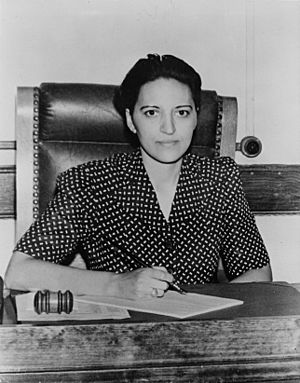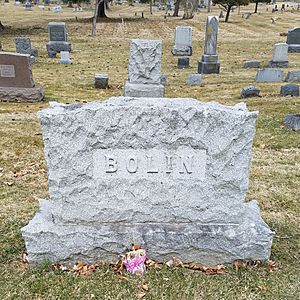Jane Bolin facts for kids
Quick facts for kids
Jane Matilda Bolin
|
|
|---|---|

Jane Bolin in 1942
|
|
| Born | April 11, 1908 |
| Died | January 8, 2007 (aged 98) Queens, New York, US
|
| Alma mater | Wellesley College (AB) Yale University (LLB) |
| Occupation | Judge |
| Years active | 1939–1978 |
| Known for | First black female judge in the United States |
| Political party | Republican |
Jane Matilda Bolin (born April 11, 1908 – died January 8, 2007) was a pioneering American lawyer and judge. She made history many times. She was the first Black woman to graduate from Yale Law School. She was also the first Black woman to join the New York City Bar Association. Later, she became the first Black woman to join the New York City Law Department. In 1939, Jane Bolin became the first Black woman to serve as a judge in the United States. She was sworn into the New York City Domestic Relations Court.
Contents
Jane Bolin's Early Life and Education
Jane Matilda Bolin was born on April 11, 1908, in Poughkeepsie, New York. She was the youngest of four children. Her father, Gaius C. Bolin, was a lawyer. He was the first Black person to graduate from Williams College. Her mother, Matilda Ingram Emery, was an immigrant from the British Isles. Sadly, her mother died when Jane was only 8 years old. Jane's father practiced law in Dutchess County for 50 years. He was also the first Black president of the Dutchess County Bar Association.
Facing Unfair Treatment as a Child
Because her parents were from different backgrounds, Jane faced unfair treatment in Poughkeepsie. Sometimes, businesses would not serve her. Jane was deeply affected by stories and pictures in The Crisis magazine. This magazine was the official publication of the National Association for the Advancement of Colored People. It showed the unfair treatment and struggles faced by Black people in the South. Jane grew up as an active member of Smith Metropolitan AME Zion Church.
College and Law School Journey
After finishing high school in Poughkeepsie, Jane wanted to go to Vassar College. However, the college did not accept Black students at that time. So, at 16 years old, she enrolled at Wellesley College in Massachusetts. She was one of only two Black freshmen there. The white students at Wellesley did not want to be friends with them. So, Jane and the other Black student decided to live off campus together.
Jane graduated from Wellesley in 1928. She was in the top 20 of her class. An advisor at Wellesley College tried to tell her not to apply to Yale Law School. This was because she was a Black woman. But Jane did not give up. In 1931, she became the first Black woman to graduate from Yale Law School. The next year, in 1932, she passed the New York state bar examination. This meant she could officially practice law.
Jane Bolin's Amazing Career
After law school, Jane worked with her father in Poughkeepsie for a short time. Then, she took a job with the New York City Corporation Counsel's office. In 1933, she married attorney Ralph E. Mizelle. They practiced law together in New York City. Her first husband, Ralph E. Mizelle, became part of a group of Black advisors to President Franklin Delano Roosevelt. He passed away in 1943. Later, Jane married Walter P. Offutt, Jr., a minister, who passed away in 1974.
Becoming the First Black Female Judge
In 1936, Jane Bolin ran for a political office called the New York State Assembly. She ran as a Republican candidate, but she didn't win. Even though she lost, running for office helped her become more well-known in New York politics.
On July 22, 1939, at the 1939 New York World's Fair, Mayor of New York City Fiorello La Guardia appointed Jane Bolin as a judge. She was 31 years old. She became a judge in the Domestic Relations Court. For 20 years, she was the only Black female judge in the entire country. She stayed a judge for 40 years. The court was renamed the Family Court in 1962. Her appointment was renewed three times. She had to retire when she turned 70 years old.
Working for Children's Rights
As a judge, Jane Bolin worked hard to make child services fair for everyone. She made sure that probation officers were assigned without caring about a person's race or religion. She also made sure that childcare agencies funded by the public accepted children no matter their ethnic background.
Bolin was a strong supporter of children's rights and education. She was a legal advisor for the National Council of Negro Women. She also served on the boards of important groups like the NAACP, the National Urban League, and the Child Welfare League. Even though she left the NAACP for a while because of some disagreements, she continued to be very active in the Civil Rights Movement. Jane Bolin also worked to fight unfair treatment from religious groups. She helped open a special school for Black boys in New York City. She received special honorary degrees from several universities, including Tuskegee Institute and Williams College.
Jane Bolin's Lasting Legacy
After she retired in 1979, Jane Bolin continued to help others. For two years, she volunteered as a reading instructor in New York City public schools. She also served on the New York State Board of Regents, where she helped review important cases.
Jane Bolin passed away on January 8, 2007, at the age of 98. She died in Long Island City, Queens, New York. She lived a life full of amazing achievements and broke many barriers.
Honoring Her Contributions
Jane Bolin and her father are shown in a special painting at the Dutchess County Court House in Poughkeepsie. The administration building for the Poughkeepsie City School District is named after her. During her lifetime, other judges, like Judith Kaye and Constance Baker Motley, said Jane Bolin inspired them in their careers. When she passed away, Charles Rangel spoke about her achievements in the U.S. House of Representatives. In 2017, a bill was introduced in the New York State Assembly to rename the Queens–Midtown Tunnel the Jane Bolin Tunnel. Jane Bolin is buried at Poughkeepsie Rural Cemetery.
See also
 In Spanish: Jane Bolin para niños
In Spanish: Jane Bolin para niños
- Macon Bolling Allen, believed to be the first Black man licensed to practice law and hold a judicial position in the United States
- Ketanji Brown Jackson, the first Black woman Associate Justice of the U.S. Supreme Court
- Thurgood Marshall, the first Black Associate Justice of the U.S. Supreme Court
- Charlotte E. Ray, the first Black woman lawyer in the United States
- List of African-American jurists
- List of first women lawyers and judges in New York
- List of first women lawyers and judges in the United States
 | Aurelia Browder |
 | Nannie Helen Burroughs |
 | Michelle Alexander |


